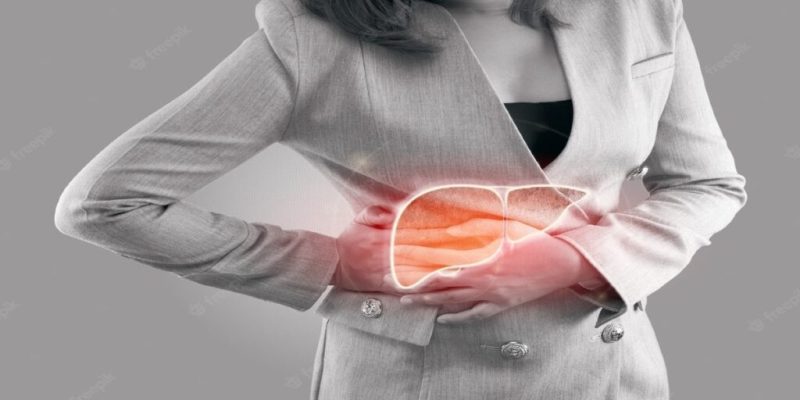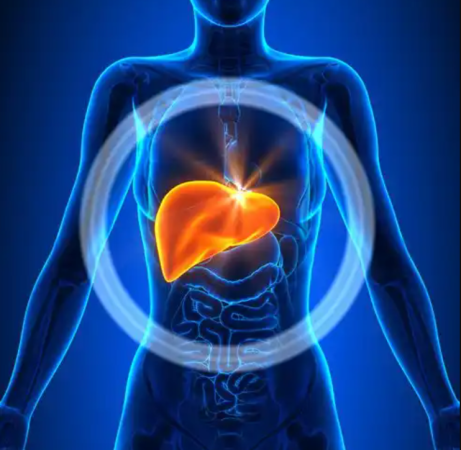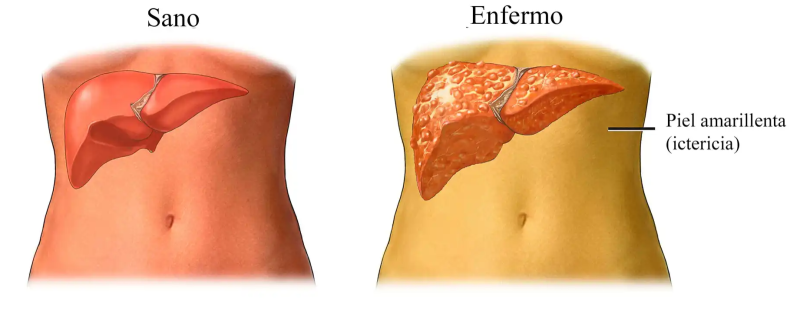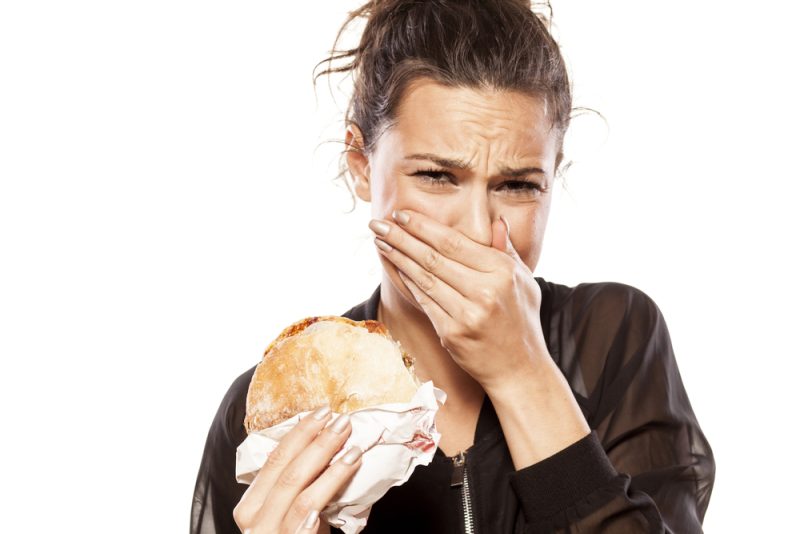
The swollen liver is also known as hepatomegaly or hepatic inflammation. It is a condition that arises when the organ increases its size and presents various symptoms.
This disease has become prevalent today. We recommend you continue reading this article to find out how to detect it.
Contents
The liver, an essential organ
 The liver is a solid organ in the upper right of the abdomen, below the diaphragm. Classically, it is divided into two main lobes, right and left, and two accessory lobes, the quadrate and Spiegel’s.
The liver is a solid organ in the upper right of the abdomen, below the diaphragm. Classically, it is divided into two main lobes, right and left, and two accessory lobes, the quadrate and Spiegel’s.
This organ has an extensive network of veins and enzymatic filters that allow it to fulfill various purification and metabolism functions in the human body. It works as follows:
- detoxifies
- clean the blood
- fight against different infections
- stores vitamins and energy
- secretes bile, a substance necessary to carry out digestive activities
hepatomegaly
Hepatomegaly does not only occur with the enlargement or widening of the liver. It also means that said organ will exceed the normal limits, which can cause a lot of discomfort.In turn, the organs around you will stop working as they should. So, the rest of the body could fail when the liver is in poor condition.
How do I know if I have an inflamed liver?
Knowing if we have an inflamed liver is not an easy task. However, certain discomforts could suggest seeing a doctor for an evaluation.
1. The pain
Although the pain may be hushed initially, it will evolve in intensity over the days. The characteristic of this pain is its location. It will always be found on the upper right side of our abdomen.
At the same time, it is possible to have swelling in the abdomen. This inflammation will gradually increase over time.
2. The fever
Fever is a sign of an alteration in the health of our body due to infections, viruses, or bacteria. However, it can also be related to the liver.
If you have a continuous fever, something is not going well with your body. In turn, if you have an inflamed liver, it is usual to have a fever regularly.
3. Jaundice

Jaundice is linked to the health of our liver. If the liver is in poor condition, you will begin to notice that your skin and eyes turn yellow.
This symptom is caused by increased blood bilirubin above 1.3 milligrams per deciliter. It always leads us to think of some liver disorder.
4. Nausea
Remember that the liver is responsible for eliminating toxins and substances that our body cannot process. This brings us to another characteristic symptom: nausea.
f the liver fails, some meals will be difficult to digest, causing nausea and general malaise. For example, those that contain excess fat, salt, flour, and even those that are highly seasoned.
5. Feces
We can always see the result of our body’s health in feces and urine. Although paying attention to them is unpleasant, it is good to stop and observe them for a couple of seconds. When this organ fails, it can cause the stool to turn clear, even white.
6. Bad taste in the mouth
A bad taste in the mouth is also a common symptom of liver inflammation. However, other pathologies can present this characteristic.
The sour taste in the mouth is due to the accumulation of toxins and substances that he should eliminate. This produces terrible aromas that will be redirected toward the mouth, causing sour flavors to be present.
7. Digestive problems
As we have already mentioned, the liver participates in the digestion of many ingested foods, especially fats. In this sense, the problematic digestion of certain foods may indicate that something is not working correctly in the liver. People can manifest a feeling of heaviness, gas, and abdominal discomfort.
8. Excessive tiredness
Another common symptom of liver disease is fatigue or excessive sleepiness for no apparent reason. According to the Catalan Association of Liver Patients, researchers do not know the exact cause of this manifestation. However, it is believed to be due to hormonal alteration and brain chemistry.
9. Changes in urine
Hepatobiliary disorders are associated with high levels of bilirubin in the blood. The latter is usually deposited excessively in the form of urobilinogen in the kidney. In this way, the urine becomes very dark and acquires an acidic consistency.
10. Itchy skin
Jaundice associated with enlarged liver often causes itchy skin or pruritus. According to studies, this is due to the accumulation of bilirubin in the skin layers, which can be very uncomfortable for people.
11. Inflammation in the abdomen and lower limbs
Liver diseases can cause edema, which is nothing more than the extravasation of fluid into a third body space. Abdominal edema is widespread in liver diseases, so it is possible to see it if you have an inflamed liver. This symptom is also known as ascites.
For its part, the edema can progress and affect the lower limbs and even the entire body in the most severe cases. This last condition is anasarca and is a reason to visit the doctor immediately.
Ascites can compress the abdomen and stomach so that people may have decreased appetite and gastroesophageal reflux. It is also possible to notice weight gain, which will be due to the accumulation of fluid from the edema.
What can cause inflammation of the liver?
As the liver is an organ linked to all the processes of our body, many factors can affect it, such as:
- overweight
- obesity
- alcoholism
- bacterial infections
- poisoning by medicines or plants
- congestive heart failure
- cancer
- fatty liver disease
- abnormal buildup of substances such as fat, protein, iron, or copper
- toxic hepatitis
- Obstruction of the bile ducts
Is it possible to prevent an inflamed liver?
As you can see, multiple causes can cause inflammation of the liver. In this sense, no measure is 100% effective in avoiding all these pathologies. However, a healthy lifestyle helps to maintain a good state of health in general and to prevent multiple conditions, including liver problems.
In this way, some of the tips that you can follow to avoid having an inflamed liver are the following:
- Maintain a healthy and balanced diet.
- Moderate alcohol intake.
- Follow directions when taking medications.
- Keep a healthy weight.
- Avoid herbal infusions, especially in children.
- Give up smoking.
- Limit contact with harmful chemicals.
To consider
See your doctor for an evaluation if you notice discomfort and have concerns. Under no circumstances should you resort to self-medication or natural remedies, as they could be counterproductive.